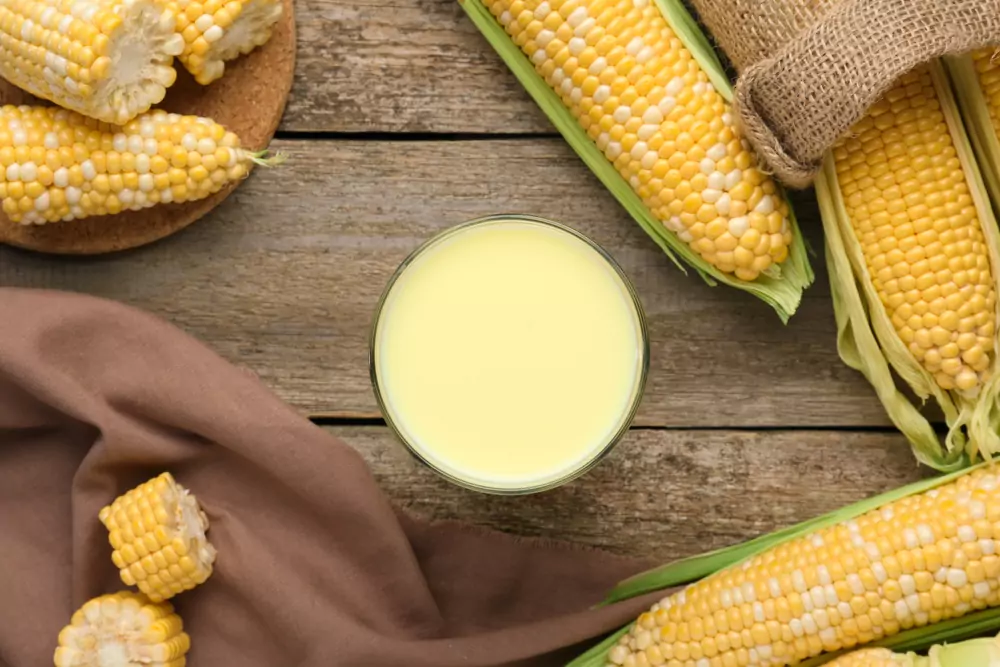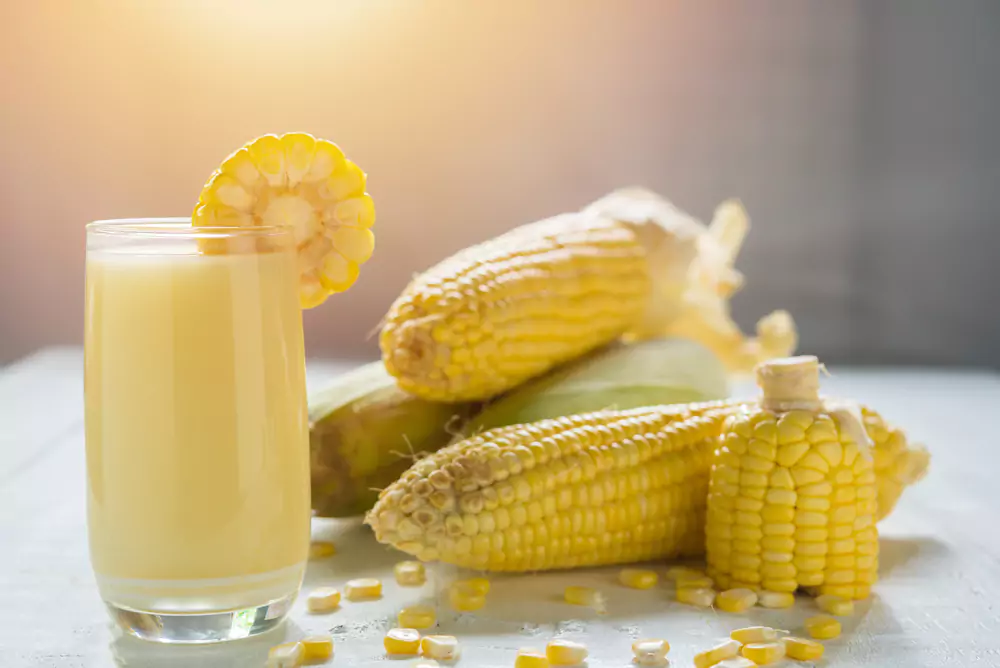Are you looking for a refreshing and nutritious beverage to quench your thirst? Look no further than corn juice! This golden elixir, derived from the humble corn kernel, offers a delightful combination of sweetness and health benefits. Packed with essential nutrients and antioxidants, corn juice has gained popularity as a natural and wholesome drink. In this article, we will delve into the various advantages of consuming corn juice and discover why it deserves a spot in your daily routine.
What Is Corn Juice?
Corn juice is a beverage made from the extraction of liquid from corn kernels. It is typically produced by grinding or blending the corn kernels and then straining the mixture to separate the juice from the solids. The resulting juice is often sweet and has a mild corn flavor. Corn juice can be consumed on its own or used as an ingredient in various recipes, such as smoothies, cocktails, or soups. It is rich in nutrients like vitamins A and C, as well as dietary fiber. Some people also use corn juice for its potential health benefits, including aiding digestion and promoting weight loss. However, it is important to note that corn juice should not be confused with corn syrup, which is a sweetener derived from corn starch.
How Is Corn Juice Made?
To make corn juice, you will need the following ingredients and equipment:

Ingredients:
- Fresh corn cobs
- Water
- Sugar or honey (optional)
- Ice cubes (optional)
Equipment:
- Blender or food processor
- Strainer or cheesecloth
- Pitcher or glass jar
Here is a step-by-step guide on how to make corn juice:
- Start by shucking the fresh corn cobs and removing the husks and silk. Rinse the corn under cold water to remove any dirt or debris.
- Hold each corn cob vertically on a cutting board and use a sharp knife to cut off the kernels. Make sure to cut close to the cob to get as much of the kernel as possible.
- Transfer the corn kernels into a blender or food processor. Add a small amount of water, just enough to cover the kernels. Blend on high speed until you have a smooth puree.
- Place a strainer or cheesecloth over a pitcher or glass jar. Pour the blended corn mixture through the strainer, allowing the juice to collect in the container while separating any solids.
- If desired, you can extract more juice by pressing down on the solids with a spoon or spatula against the strainer or cheesecloth. This will help release any remaining liquid.
- Taste the extracted corn juice and if desired, add sugar or honey to sweeten it according to your preference. Stir well until the sweetener is fully dissolved.
- If you prefer your corn juice chilled, refrigerate it for at least an hour before serving. You can also add ice cubes to individual glasses for an extra refreshing drink.
Nutritional Benefits Of Corn Juice
Corn juice is a nutritious beverage that offers several health benefits. It is made by extracting the juice from corn kernels, which are rich in essential nutrients. Here are some of the nutritional benefits of corn juice:

Vitamins and Minerals:
Corn juice is a good source of various vitamins and minerals. It contains significant amounts of vitamin C, which is essential for immune function, collagen production, and wound healing. Additionally, corn juice provides vitamin A, which supports eye health and immune function. It also contains minerals like potassium, magnesium, and phosphorus, which are important for maintaining proper bodily functions.
Antioxidants:
Corn juice contains antioxidants that help protect the body against oxidative stress caused by harmful free radicals. These antioxidants include lutein and zeaxanthin, which are beneficial for eye health and may reduce the risk of age-related macular degeneration. Corn juice also contains ferulic acid, a powerful antioxidant that has been linked to various health benefits, including reducing inflammation and protecting against chronic diseases.
Dietary Fiber:
Corn juice is a good source of dietary fiber, which plays a crucial role in digestive health. Fiber helps regulate bowel movements, prevents constipation, and promotes a healthy digestive system. It also aids in weight management by promoting feelings of fullness and reducing calorie intake.
Energy:
Corn juice is relatively high in carbohydrates, providing a quick source of energy for the body. This can be particularly beneficial for athletes or individuals engaging in physical activities that require endurance.
Digestible Protein:
While corn juice is not as high in protein as other plant-based beverages like soy or almond milk, it still contains a small amount of digestible protein. Protein is essential for building and repairing tissues, supporting immune function, and producing enzymes and hormones.
Can Corn Juice Be Consumed By Everyone?
No, corn juice cannot be consumed by everyone. While corn juice is generally safe for consumption, there are certain groups of people who should avoid or limit their intake of corn juice. Individuals with corn allergies or sensitivities should avoid consuming corn juice as it may trigger allergic reactions such as itching, hives, or digestive issues. Additionally, individuals with certain medical conditions such as diabetes or irritable bowel syndrome (IBS) may need to limit their intake of corn juice due to its high sugar content or potential to exacerbate digestive symptoms. It is always recommended to consult with a healthcare professional before incorporating any new food or beverage into your diet.
Potential Side Effects Or Risks Associated With Drinking Corn Juice
Drinking corn juice is generally considered safe for most people when consumed in moderation. However, there are potential side effects or risks associated with drinking corn juice that individuals should be aware of. It is important to note that these side effects or risks may vary depending on an individual’s overall health, medical conditions, and any potential allergies or sensitivities they may have.
Allergic Reactions:
Some individuals may be allergic to corn or have a sensitivity to it. In such cases, consuming corn juice can lead to allergic reactions, including symptoms such as itching, hives, swelling, difficulty breathing, and in severe cases, anaphylaxis. It is crucial for individuals with known corn allergies or sensitivities to avoid consuming corn juice.
Digestive Issues:
Corn juice contains a high amount of fiber, which can be beneficial for digestion in moderate amounts. However, excessive consumption of corn juice can lead to digestive issues such as bloating, gas, diarrhea, and stomach cramps. Individuals with sensitive digestive systems or those prone to gastrointestinal problems should consume corn juice in moderation and monitor their body’s response.
Blood Sugar Spikes:
Corn juice has a relatively high glycemic index (GI), which means it can cause a rapid increase in blood sugar levels. This can be problematic for individuals with diabetes or those who need to manage their blood sugar levels carefully. Drinking excessive amounts of corn juice may lead to spikes in blood sugar levels and potentially disrupt glucose control.
Weight Gain:
Corn juice is relatively high in calories compared to other vegetable juices. Regular consumption of large quantities of corn juice without considering overall calorie intake can contribute to weight gain over time. It is essential to incorporate corn juice into a balanced diet and consider portion sizes to avoid excessive calorie intake.
Pesticide Residues:
Corn crops are often treated with pesticides to protect them from pests and diseases. While regulations are in place to ensure safe levels of pesticide residues on food products, some individuals may be concerned about potential exposure. Choosing organic corn juice or thoroughly washing and peeling non-organic corn before juicing can help reduce pesticide exposure.
Conclusion
In conclusion, the health benefits of corn juice are numerous and impressive. This delicious beverage is packed with essential nutrients such as vitamins A, B, and C, as well as minerals like potassium and magnesium. It is also a great source of dietary fiber, which aids in digestion and promotes a healthy gut. Additionally, corn juice contains antioxidants that help protect the body against oxidative stress and reduce the risk of chronic diseases. Its high water content makes it a hydrating option, while its low calorie count makes it suitable for those watching their weight.
Frequently Asked Questions
What Is Corn Juice Good For?
Corn juice is good for promoting digestion, boosting immunity, and providing essential nutrients like vitamins and minerals.
What Is Corn Juice Made Of?
Corn juice is made from the liquid extracted from corn kernels, which is then processed and filtered to remove any solids or impurities. It can be consumed on its own or used as an ingredient in various recipes.
Is It Ok To Drink The Juice From Canned Corn?
Yes, it is generally safe to consume the juice from canned corn, but there are some precautions to consider.
Can You Juice Corn Cobs?
Yes, you can juice corn cobs, but it is not a common practice as the cob itself does not contain much juice and may not yield a significant amount of liquid.





![5 Best Ways for Juice Storage - [ Store Fruits & Vegetables Juice ] Juice Storage](https://juicerhunter.com/wp-content/uploads/2024/01/Juice-Storage-150x150.webp)
